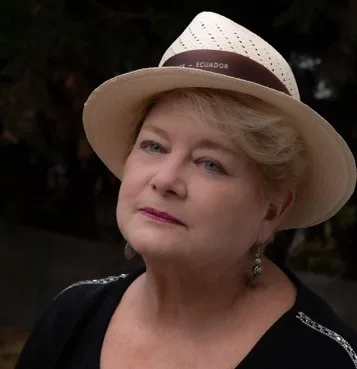During the holiday season, consider the powerful message of the ‘Desiderata’
By Garnett Stewart
For our new 2024, I propose a well-known poem known as “Desiderata.” It was discovered on the wall of the Episcopal  Church of my family in Baltimore, Maryland. Unsigned and dated 1692.
Church of my family in Baltimore, Maryland. Unsigned and dated 1692.
My family’s plantation was established on land that is now part of Johns Hopkins University and Hospital. Despite suffering severe losses during the Great Depression, my Great Uncle Wilmer refused to allow Maryland to seize his property for unpaid taxes. As a result, he gave the land away.
The traditional names of the plantation streets have been retained, with Church Avenue serving as the main entry of Old St Paul’s Episcopal Church. My ancestors are buried in Old St. Paul’s Episcopal Church, which was constructed between 1640 and 1641, shortly after Maryland became one of the thirteen original colonies.
 Every small town, even plantations, featured a church and a general store. We see this tradition here in Ecuador. This allowed locals, including slaves and masters, to pray and acquire necessities of life.
Every small town, even plantations, featured a church and a general store. We see this tradition here in Ecuador. This allowed locals, including slaves and masters, to pray and acquire necessities of life.
With names like Brown, Clarke, Wilmer, Adt, Clifford, and other extremely British names, it’s hardly surprising that my family has been Episcopalians for generations.
Garnett Chappell Clarke Stewart was born in 1955. My middle name is after Thomas Chappell, a Frenchman, who paid the Native Americans $30 and other trinkets to purchase Staten Island. I am the last remaining Chappell. The Chappell Trust made the final trust fund payment to my parents.
All food and animals were raised and prepared for human consumption. Excesses were eventually sold to inhabitants in the nearby area. This was community business of the late 1700s, and the Wilmer estate was prosperous.
Maryland did, in fact, gain statehood in 1788. For many years, my family was involved in politics in both Maryland and Virginia. They were well-known figures who had a significant impact on the histories of their respective states. Previously the Governor and Governess of Virginia, for example, were painted and displayed in the Smithsonian’s Peale Museum until about 1960. They were my fifth-generation ancestors on my father’s side of the family. As many families did, closely related members of certain families married to carry on the traditions. Thus, Brown married Clarke.
My forefathers appear to have been kind slave owners. I have photographs of liberated slaves who chose to continue their lives on the plantation after emancipation. My mother’s wet nurse had been a slave. Many people are unaware of the purpose of a wet nurse, but an aristocratic woman wants to maintain her figure. Back then she would use a wet nurse. A wet nurse was a milk-producing mother who fed the baby of another woman.
Around 1932, the Wilmer Plantation was given to Johns Hopkins University. The Wilmer Eye Institute was named after my family’s contribution to Johns Hopkins University. My previous eye doctor in Houston attended Hopkins University and was linked with Baylor College of Medicine. I was my ophthalmologists first nurse. In addition, during WWII, my parents founded two Episcopal churches in Houston. Following WWII, the Homes of Saint Marks Adoption Agency was created in my parents’ Houston home.
The plantation church, Old St. Pauls’ Church, is still in use today. It is over 400 years old now. There are other gravestones with my family names, such as Wilmer and Brown, in the adjacent church cemetery. My great-uncle Wilmer provided a playground for my mother and my father. Mary Garnett Brown Clarke, my mother, and DeWitt Forman Clarke Sr. were childhood friends. When I was a teenager, my grandmother was laid to rest at Old St. Paul’s Episcopal Church. I carried her ashes from Texas to our family church in Baltimore. Remember when we dressed to travel and I wore Mary Janes and white gloves with my pink chenille suit.
It has long been known that the Desiderata was anonymously put in the family church in 1692.
According to the Internet, Max Erdman was the alleged author, however this is unclear. Nobody is alive today. I’m not sure how Max Erdman came to be identified as the “attributed author” of a poem put anonymously in the chapel in 1692 centuries later in 1932. The data is contradictory. Erdman was not an Episcopalian, and a century ago, the Catholic and Episcopalian worlds clashed fiercely. I believe it was a religious conflict rather than serious historical research. So, I disagree. It is not an Erdman poem.
People sought honor for God in the 1690’s and not honor for themselves.
I hope you will reread the Desiderata and enjoy it more now that you have some history behind it.
Desiderata
Go placidly amid the noise and the haste, and remember what peace there may be in silence. As far as possible, without surrender, be on good terms with all persons.
Speak your truth quietly and clearly; and listen to others, even to the dull and the ignorant; they too have their story.
Avoid loud and aggressive persons; they are vexatious to the spirit. If you compare yourself with others, you may become vain or bitter, for always there will be greater and lesser persons than yourself.
Enjoy your achievements as well as your plans. Keep interested in your own career, however humble; it is a real possession in the changing fortunes of time.
Exercise caution in your business affairs, for the world is full of trickery. But let this not blind you to what virtue there is; many persons strive for high ideals, and everywhere life is full of heroism.
Be yourself. Especially do not feign affection. Neither be cynical about love; for in the face of all aridity and disenchantment, it is as perennial as the grass.
Take kindly the counsel of the years, gracefully surrendering the things of youth.
Nurture strength of spirit to shield you in sudden misfortune. But do not distress yourself with dark imaginings. Many fears are born of fatigue and loneliness.
Beyond a wholesome discipline, be gentle with yourself. You are a child of the universe no less than the trees and the stars; you have a right to be here.
And whether or not it is clear to you, no doubt the universe is unfolding as it should. Therefore, be at peace with God, whatever you conceive Him to be. And whatever your labors and aspirations, in the noisy confusion of life, keep peace in your soul. With all its sham, drudgery and broken dreams, it is still a beautiful world. Be cheerful. Strive to be happy.
Found in Old St. Paul’s Episcopal Church, Baltimore, 1692
___________________
 Garnett Stewart is a permanent resident of Ecuador. She is a retired Adult Medicine Nurse Practitioner with a specialty in Cardiology and Cardiovascular Surgery and is the author of several published articles. She holds Bachelors and Masters degrees in nursing. Her undergraduate university studies focused on biochemistry and biophysics. She can be contacted at Ecuador.advice@gmail.com
Garnett Stewart is a permanent resident of Ecuador. She is a retired Adult Medicine Nurse Practitioner with a specialty in Cardiology and Cardiovascular Surgery and is the author of several published articles. She holds Bachelors and Masters degrees in nursing. Her undergraduate university studies focused on biochemistry and biophysics. She can be contacted at Ecuador.advice@gmail.com





















